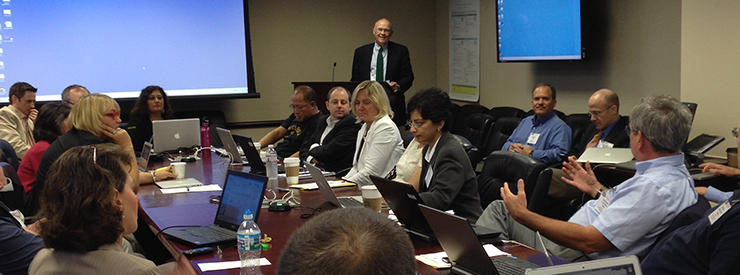
Care of the heart in Duchenne is not a simple business.
As a community, we realize:
- Prescriptions for cardiac care and surveillance differ widely between both practices and providers.
- Large gaps exist in cardiac research.
- While future goals are necessary, we need a plan, for both cardiac care and research, and we need it now.
Fortunately, more than 30 representatives from the cardiac care, cardiac research, the National Heart Lung and Blood Institute (NHLBI) and the FDA agreed, and were gracious enough to give two days of their very busy lives to discuss just these issues. These are professionals who deeply care about the Duchenne community and who have worked tirelessly in this field. The passion in the room was palpable, and the vast amount of knowledge was astounding. A formal executive summary will be forthcoming from NHLBI, but I will give a brief summary here.
The meeting was organized by Jonathan Kaltman (NHLBI), Brian Denger (PPMD), and myself (PPMD), and was led by Elizabeth McNally (University of Chicago) and Larry Markham (Vanderbilt University). The following questions were addressed:
Natural history
- Is there an association between cardiac fibrosis and cardiac dysfunction?
- What is the importance of genetic variants in cardiac dysfunction?
- Is there an association between cardiac fibrosis and cardiac arrhythmias?
- What is the true incidence of sudden cardiac death?
Diagnosis and monitoring
- What monitoring/imaging should be standard?
- When should monitoring start?
- What efforts are underway to advance knowledge and use of current, biomarkers and identify new cardiac biomarkers?
Medical therapy
- What is standard cardiac therapy?
- When should it be started?
- Are there lessons to be learned from adult heart failure?
- How will new skeletal muscle therapies affect the heart?
Non-medical therapies
- Are heart transplants and left ventricular assist devices viable options in Duchenne?
- When is ICD placement appropriate?
- Can the use of devices change the natural history of Duchenne?
Feedback from the FDA indicated that they are interested in receiving recommendations for cardiac surveillance and markers for current and future clinical trials, from this meeting. A letter detailing these recommendations will be immediately forthcoming.
Results from the working group indicated that three major small groups should be formed. These small groups will update and summarize current knowledge, and will make recommendations regarding for future research in each area. The three areas identified include: clinical cardiac care, animal research and human research. Leaders have been proposed and initial reports are expected within six months.
The Duchenne heart is complex to investigate and manage, but not impossible. Sometimes it’s about having the right mix of people in the room, and this was the best of the best.
To learn more about PPMD’s Cardiac Initiative and other cardiac care issues in Duchenne, visit our website.



 by: Parent Project Muscular Dystrophy
by: Parent Project Muscular Dystrophy

